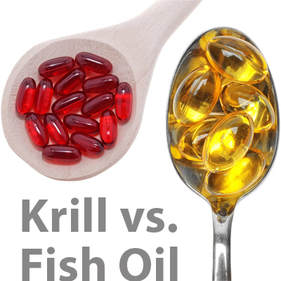Fish Oil vs. Krill Oil: Which Is the Ultimate Omega-3 Champion?
In the quest for better health and well-being, Omega-3 fatty acids play a starring role. These essential fats offer a multitude of benefits, from heart health to brain function. When it comes to Omega-3 supplements, two options dominate the market: fish oil and krill oil. In this comprehensive guide, we’ll explore the nuances of fish oil vs. krill oil, helping you make an informed choice that suits your individual needs and preferences.
What Are Fish Oil and Krill Oil?

Fish oil vs krill oil
Fish Oil:
Fish oil is derived from fatty fish like salmon, mackerel, and sardines. It has been a staple in Omega-3 supplementation for decades. The oil is typically extracted from the tissues of these cold-water fish, and it contains two crucial Omega-3 fatty acids: eicosapentaenoic acid (EPA) and docosahexaenoic acid (DHA).
Krill Oil:
Krill oil, on the other hand, is sourced from tiny shrimp-like crustaceans known as krill. These small, red marine creatures are found in abundance in the cold waters of the Antarctic and other oceans. Krill oil contains Omega-3s in the form of both EPA and DHA, but what sets it apart is its unique composition. Unlike fish oil, krill oil delivers Omega-3s in the form of phospholipids, making it easier for the body to absorb.
Nutritional Comparison
Understanding the nutritional profile of fish oil and krill oil is essential in making an informed choice. Let’s break down the key differences:
Omega-3 Content:
Fish Oil:
Fish oil is renowned for its high Omega-3 content, particularly in terms of EPA and DHA. A typical fish oil supplement contains around 30% Omega-3s by weight.
Krill Oil:
Krill oil may have a lower overall Omega-3 content compared to fish oil, but it boasts a unique advantage. Thanks to its phospholipid form, krill oil’s Omega-3s are more easily absorbed by the body, potentially making it more efficient despite the lower total content.
Antioxidants:
Fish Oil:
Fish oil contains minimal antioxidants, leaving it vulnerable to oxidation and the development of an unpleasant fishy odor or taste over time.
Krill Oil:
Krill oil is naturally rich in antioxidants, such as astaxanthin, which helps prevent oxidation. This means krill oil supplements are less likely to go rancid and cause fishy burps.
Sustainability:
Fish Oil:
The production of fish oil often involves the capture of large numbers of fish, raising concerns about overfishing and its environmental impact.
Krill Oil:
Krill oil is sourced from a highly sustainable krill population in the Antarctic, making it a more environmentally friendly choice.
Bioavailability and Absorption
When it comes to Omega-3 supplements, it’s not just about what’s in the capsule but also how efficiently your body can absorb and utilize these essential fatty acids. This is where fish oil and krill oil diverge significantly.
Fish Oil:
Fish oil delivers Omega-3s in the form of triglycerides. While the body can certainly absorb triglyceride-based Omega-3s, it may not be as efficient as other forms. Some factors, such as the presence of dietary fats, can affect the absorption rate. As a result, you might need to take larger doses of fish oil to achieve the desired benefits.
Krill Oil:
Krill oil stands out due to its unique composition. It provides Omega-3s in the form of phospholipids, which are similar to the body’s cell membranes. This structural similarity enhances the absorption of Omega-3s, making krill oil a more bioavailable option. Research suggests that you may need smaller doses of krill oil to achieve the same effects as larger doses of fish oil.
Health Benefits
Fish Oil Benefits:
Heart Health:
Fish oil has a well-established reputation for supporting cardiovascular health. It can help lower triglycerides, reduce blood pressure, and lower the risk of heart disease.
Brain Function:
Omega-3s in fish oil, particularly DHA, play a crucial role in brain development and cognitive function. They may help improve memory and reduce the risk of cognitive decline.
Inflammation and Joint Health:
Fish oil has anti-inflammatory properties that can benefit individuals with conditions like arthritis, reducing joint pain and stiffness.
Eye Health:
DHA, found in fish oil, is a major component of the retina. It may help maintain good vision and reduce the risk of age-related macular degeneration.
Krill Oil Benefits:
Heart Health:
Krill oil is also known for its heart-healthy benefits, including reducing inflammation and improving cholesterol levels. The phospholipid structure may enhance its efficacy.
Joint Health:
Like fish oil, krill oil’s anti-inflammatory properties can be beneficial for joint health, potentially alleviating symptoms of arthritis.
Brain Health:
Krill oil’s unique form of Omega-3s may enhance cognitive function and mood regulation.
Antioxidant Properties:
Thanks to the natural presence of astaxanthin, krill oil offers antioxidant protection, which can benefit overall health.
Potential Side Effects
While fish oil and krill oil are generally considered safe when taken as directed, it’s essential to be aware of potential side effects and safety considerations:
Fish Oil:
Fishy Aftertaste:
Some individuals may experience fishy burps or aftertaste when taking fish oil supplements. Choosing enteric-coated capsules or refrigerated options can help minimize this issue.
Blood-Thinning Effect:
Fish oil has a mild blood-thinning effect, which can be beneficial for heart health but may interact with blood-thinning medications. Consult with a healthcare professional if you’re on such medications.
Digestive Discomfort:
High doses of fish oil may lead to digestive issues like diarrhea or indigestion in some people. Start with a lower dose and gradually increase it to minimize these effects.
Krill Oil:
Allergic Reactions:
If you have a shellfish allergy, consult with a healthcare professional before taking krill oil supplements, as krill is a crustacean.
Digestive Upset:
Just like fish oil, krill oil can cause digestive discomfort at higher doses. Start with a lower dose and adjust as needed.
Interactions with Medications:
Krill oil may interact with blood-thinning medications, similar to fish oil. Consult with your healthcare provider if you’re taking such medications.
Sustainability and Environmental Impact
In recent years, environmental concerns have led many individuals to consider not only the health benefits of Omega-3 supplements but also their impact on the planet. Here’s how fish oil and krill oil stack up in terms of sustainability:
Fish Oil:
The production of fish oil often involves the capture of large quantities of fish, potentially contributing to overfishing and threatening marine ecosystems. Some fish oil brands prioritize sustainability by sourcing from responsibly managed fisheries. Look for certifications like the Marine Stewardship Council (MSC) to make eco-friendly choices.
Krill Oil:
Krill oil has a more favorable sustainability profile. Krill is abundant in the Antarctic, and harvesting practices are closely monitored to ensure the krill population remains stable. As a result, krill oil is often considered a more environmentally friendly choice.
FAQs to Omega-3 fish oil and krill oil:
Q: What are Omega-3 fatty acids, and why are they important for health?
A: Omega-3 fatty acids are essential fats that play a vital role in overall health. They are known for their benefits in supporting heart health, and brain function, and reducing inflammation.
Q: What’s the main difference between fish oil and krill oil?
A: The primary difference lies in their source and the form of Omega-3s they contain. Fish oil comes from fatty fish and provides triglyceride-based Omega-3s, while krill oil is derived from krill and offers Omega-3s in the form of phospholipids.
Q: Are there any dietary restrictions I should consider when choosing between fish oil and krill oil?
A: Individuals with shellfish allergies should avoid krill oil, as krill are crustaceans. Both options may not be suitable for vegetarians or vegans.
Q: Can I take both fish oil and krill oil together for added benefits?
A: Yes, it’s generally safe to take both supplements together, but be cautious not to exceed recommended Omega-3 intake levels.
Q: How do I determine the right dosage of fish oil or krill oil for my needs?
A: The recommended dosage varies by product and health goal. Consult the supplement label and seek guidance from a healthcare professional.
Q: Do Omega-3 supplements interact with medications?
A: Both fish oil and krill oil have mild blood-thinning effects, potentially interacting with blood-thinning medications. Consult your healthcare provider for personalized advice.
Q: Do these supplements have side effects, like fishy burps?
A: Some individuals may experience a fishy aftertaste or digestive discomfort with fish oil. Krill oil, with its phospholipid form, is often better tolerated in this regard.
Q: Are there any age restrictions for taking Omega-3 supplements?
A: Omega-3 supplements are generally safe for adults, but consult with a healthcare provider before giving them to children or older adults.
Q: Are there any long-term health risks associated with Omega-3 supplementation?
A: When taken as directed, Omega-3 supplements are considered safe. However, extremely high doses can lead to bleeding issues, so it’s essential to follow recommended dosages.
Q: Can I get enough Omega-3s from my diet alone, without supplements?
A: A balanced diet that includes fatty fish can provide adequate Omega-3s for many people. Supplements are often recommended when dietary sources are insufficient or for specific health goals.
Conclusion
In the quest to harness the numerous health benefits of Omega-3 fatty acids, the choice between fish oil and krill oil can seem daunting. However, armed with the knowledge and insights from this comprehensive guide, you’re well-prepared to make an informed decision that aligns with your unique preferences and health goals.




